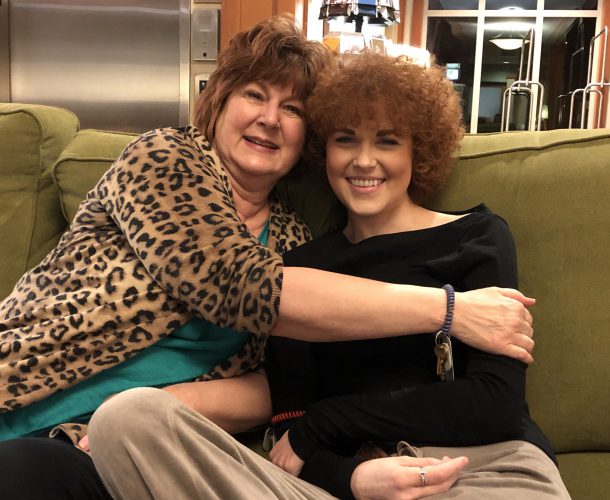
When Madeline Boese was 14, she had visions of pointe shoes, tutus and sugar plums dancing in her head. She dreamed of becoming a professional ballerina, and hoped for a future in the spotlight doing what she loved.
Unfortunately, her body had different plans.
One day in ballet class in December 2006, she noticed an odd golf ball-sized lump on her left thigh below her pink tights. Her mom, Terri Boese, said a trip to their doctor in their hometown of Plano, Texas, led to a bone-chilling discovery.
“I was terrified when I heard ‘malignancy detected,’” Boese said. “It was awful and so out of the blue. I felt like I was going to hyperventilate, and it took all I had to hold myself together.”
Madeline was immediately referred to a hospital in Dallas where she was diagnosed with acute lymphoblastic leukemia (ALL). From there, Boese said everything moved rapidly as Madeline began what would be two and a half years of grueling chemotherapy treatment.
Just two weeks into treatment, Madeline faced the harsh reality that the curtain had closed on her dream of becoming a ballerina. She developed diabetic ketoacidosis (DKA), which occurs when the body starts breaking down fat at a rapid rate. She quickly lost 20 pounds, including the majority of her muscle, and became very weak.
“It was very hard because ballet was my dream and my emotional escape,” Madeline, now 26, said. “The whole experience was so scary and surreal, and it was as though my own body had turned against me.”
The race to keep up
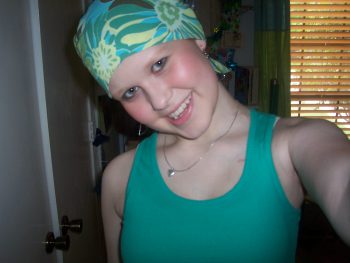 For the next few years, Madeline was constantly in and out of the hospital for treatment. A gifted student in the 9th grade, she was determined to keep her school life on track through home study and also going to class when she could. But it wasn’t easy.
For the next few years, Madeline was constantly in and out of the hospital for treatment. A gifted student in the 9th grade, she was determined to keep her school life on track through home study and also going to class when she could. But it wasn’t easy.
“My diagnosis really hit me when I was able to go back to school and saw how different I was from other normal 14 and 15 year olds,” Madeline said. “With the demands of treatment, it also became so much harder to keep up with my peers in school, and I had to put a lot of pressure on myself to keep up.”
The reality of how much her life had changed also hit her in February 2007 when she went to her school’s Valentine’s Day dance.
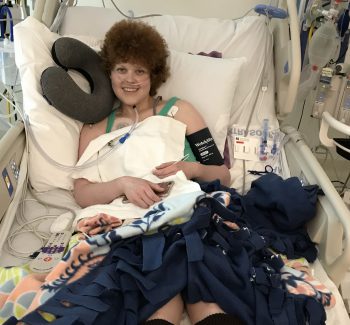
“It was really hard because I didn’t have hair so I needed a wig, my body had changed making it tough to find a dress, and I had to go to the dance with a port,” Madeline said. “I just didn’t feel like myself anymore.”
Over the next few years, she struggled with immense side effects from her chemotherapy, including developing avascular necrosis, which is the death of bone tissue due to insufficient blood supply. This led to a hip replacement when she was only 18.
But after nearly three years, she achieved remission. What’s more, Madeline’s focus on her studies paid off – she graduated on time with the rest of her class, and with honors.
“I was thrilled she was finally on the other side of her treatment, and I was just so proud of her and all she had accomplished,” said Boese.
The birth of a new dream, a devastating relapse
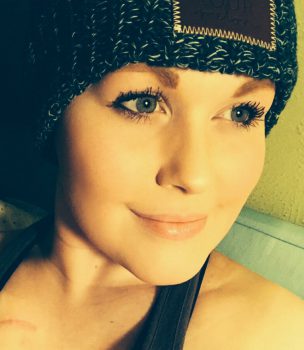 She was unfortunately not able to go off to college like her friends due to the side effects from treatment, but she got a job in retail and started thinking about what her future may hold. She knew exactly what she wanted to do.
She was unfortunately not able to go off to college like her friends due to the side effects from treatment, but she got a job in retail and started thinking about what her future may hold. She knew exactly what she wanted to do.
“I knew I wanted to become a pediatric oncology nurse because of what I had been through,” Madeline said. “I saw the positive impact that the nurses had on so many kids like me with cancer and I wanted to give back in the same way.”
As she began planning to achieve her new dream at the age of 21, her health took a turn for the worse. She suffered from intense migraines and was exhausted all of the time. A routine blood test showed her cancer had come back. Her dream had to be put on hold as she embarked on another two and a half years of intensive chemotherapy treatment.
“I was blindsided by the relapse,” said Madeline. “I thought I was getting better and able to start living my life, but there I was having to do it all over again.”
A punch in the stomach
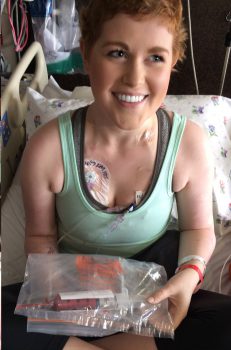
In January 2016, Madeline was finally cancer-free once again.
“While I was happy to be in remission, I was cautiously optimistic and I didn’t want to allow myself to get too excited,” Madeline said.
And for good reason. Routine lab tests soon after showed her cancer had come back once again. This time, a bone marrow transplant was her only option. In March 2017, she had the transplant and was again in remission in April 2017.
But less than a year later, Madeline received yet another blow after she noticed a lump in her breast. Her cancer had returned for the third time and the leukemia manifested as multiple tumors in her breast.
“At that point I just thought I was out of options,” Madeline said. “I just didn’t even want to deal with it.”
Boese added, “I’ll never forget when her oncologist said, ‘I no longer have a prognosis for you.’ It felt like I had been punched in the stomach and we thought that was the end.”
Hope is found in CAR T-cell immunotherapy
Over the next few months, Madeline’s oncologist searched for other possible treatment options and found Seattle Children’s Pediatric Leukemia Adoptive Therapy (PLAT-02) chimeric antigen receptor (CAR) T-cell immunotherapy clinical trial for children and young adults with relapsed or refractory ALL. He told Madeline and her family that was where she needed to go.
CAR T-cell immunotherapy is one of the most promising experimental cancer therapies of our time. The therapy, which takes place over the course of a few weeks, reprograms a patient’s own T cells in their immune system to seek out and destroy cancer without harming healthy cells.
“I was so excited because we finally had another option that could save her life – we finally had hope,” Boese said. “It was also a relief that the therapy was much less daunting than having to face another 2 and a half years of intensive therapy.”
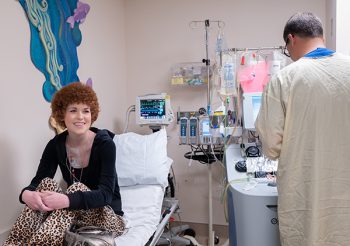
Madeline, who had suffered from many side effects from conventional cancer treatment over the years, added, “I was so happy to have a therapy that could get rid of my cancer while not hurting me like my previous treatments had done.”
In September of 2018, Madeline received her cancer-fighting T cells. That same month she got the news she was in remission once again. In the beginning of October, scans also revealed her tumors had disappeared.
“I was so happy to be in remission again, but of course with everything I had experienced, I was cautiously optimistic wondering if this time it would ‘stick,’” she said.
Luckily, Dr. Colleen Annesley, an oncologist at Seattle Children’s, had a plan to help increase her chances of staying in remission for good this time.
Annesley explains that if a patient loses their cancer-fighting CAR T cells soon after receiving them, it can allow the cancer to come back. Researchers have learned from PLAT-02 that some patients have a higher risk of this occurring, including those like Madeline who have a lower number of cancer cells in their bone marrow to serve as a stimulus for the reprogrammed T cells.
In an effort to combat this, Annesley and her team opened the PLAT-03 trial, a first-of-its kind pilot study that is showing promise in prolonging the persistence of CAR T cells by using one to six “booster” infusions, called T cell antigen-presenting cells (T-APCs). The T-APCs have been genetically modified to stimulate the CAR T cells by serving as a target for them to attack. Researchers hope these booster infusions will re-activate the cancer fighting CAR T cells, helping to ensure their persistence long enough to put patients into long-term remission.
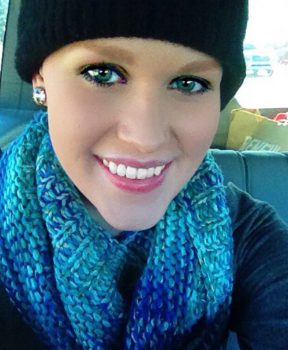
Over the next few months, Madeline returned to Seattle to receive a series of five “booster” infusions with T-APCs.
“It was so exciting to be one of the first people in the world to try these new experimental therapies that are unbelievably hopeful and comforting for patients like me who are in need of an answer,” Madeline said.
In March 2019, tests showed that the boosters were doing their job and her CAR T cells were very much alive and thriving at six months. Annesley said from what they’ve learned, the six month milestone is key. If a patient’s CAR T cells are still present at that point, there is a higher likelihood they won’t relapse.
“This is incredibly exciting because Madeline was one of the patients who had a high chance of losing persistence of her CAR T cells early, opening the door for her disease to return,” Annesley said. “But by stimulating her CAR T cells over time, they have persisted so she now has a very good chance of remaining in remission. We are beyond thrilled that this new approach has appeared to work for Madeline, especially after all she has been through. She is an extraordinarily brave and remarkable young woman!”
The pursuit of a new dream
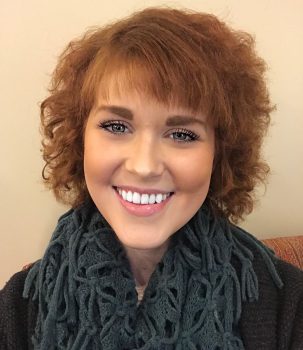 With cancer finally behind her after a 12-year battle, Madeline is ready to start living her life.
With cancer finally behind her after a 12-year battle, Madeline is ready to start living her life.
“I’ve noticed a big difference in her,” Boese said. “She is feeling better, going out with friends, going to movies, and she is finally excited about her future.”
Madeline said she has found a renewed sense of hope, and she is looking into enrolling in classes in the fall as she pursues her dream of being an oncology nurse.
“I want to give back to the oncology world for being there for me, treating me so well over the years and saving my life,” Madeline said. “I want to have the same impact on other peoples’ lives someday. It’s where I belong.”
If you are interested in supporting the advancement of immunotherapy and cancer research at Seattle Children’s, please visit our donation page.
Resources:
- Two Years Cancer-Free, Erin Advocates for T-Cell Immunotherapy
- Harper Beare is ‘Doing Something Amazing’
- Milton Wright Finds His Way Back ‘Home’
- Fighting for Their Lives: Seattle Children’s Immunotherapy Journey
- Seattle Children’s Cancer and Blood Disorders Center

